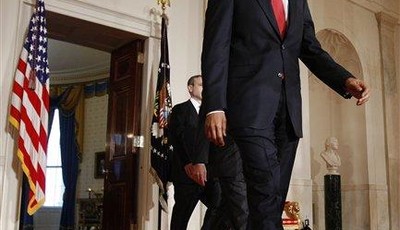 Justice David Souter's retirement from the Supreme Court presents President Barack Obama with his first opportunity to appoint someone to the High Court. People who are speculating about whether the next nominee will be a woman, a Hispanic or whatever, are missing the point.
Justice David Souter's retirement from the Supreme Court presents President Barack Obama with his first opportunity to appoint someone to the High Court. People who are speculating about whether the next nominee will be a woman, a Hispanic or whatever, are missing the point.
That we are discussing the next Supreme Court justice in terms of group "representation" is a sign of how far we have already strayed from the purpose of law and the weighty responsibility of appointing someone to sit for life on the highest court in the land.
That President Obama has made "empathy" with certain groups one of his criteria for choosing a Supreme Court nominee is a dangerous sign of how much further the Supreme Court may be pushed away from the rule of law and toward even more arbitrary judicial edicts to advance the agenda of the left and set it in legal concrete, immune from the democratic process.
Would you want to go into court to appear before a judge with "empathy" for groups A, B and C, if you were a member of groups X, Y or Z? Nothing could be further from the rule of law. That would be bad news, even in a traffic court, much less in a court that has the last word on your rights under the Constitution of the United States.
Appoint enough Supreme Court justices with "empathy" for particular groups and you would have, for all practical purposes, repealed the 14th Amendment, which guarantees "equal protection of the laws" for all Americans.
We would have entered a strange new world, where everybody is equal but some are more equal than others. The very idea of the rule of law would become meaningless when it is replaced by the empathies of judges.
Barack Obama solves this contradiction, as he solves so many other problems, with rhetoric. If you believe in the rule of law, he will say the words "rule of law." And if you are willing to buy it, he will keep on selling it.
Those people who just accept soothing words from politicians they like are gambling with the future of a nation. If you were German, would you be in favor of a law "to relieve the distress of the German people and nation"? That was the law that gave Hitler dictatorial power.
He was just another German chancellor at the time. He was not elected on a platform of war, dictatorship or genocide. He got the power to do those things because of a law "to relieve the distress of the German people."
When you buy words, you had better know what you are buying.
In the American system of government, presidential term limits restrict how long any given resident of the White House can damage this country directly. But that does not limit how long, or how much, the people he appoints to the Supreme Court can continue to damage this country, for decades after the president who appointed them is long gone.
Justice John Paul Stevens virtually destroyed the Constitution's restrictions on government officials' ability to confiscate private property in his 2005 decision in the case of "Kelo v. New London"-- 30 years after President Ford appointed him.
The biggest danger in appointing the wrong people to the Supreme Court is not just in how they might vote on some particular issues-- whether private property, abortion or whatever. The biggest danger is that they will undermine or destroy the very concept of the rule of law-- what has been called "a government of laws and not of men."
Under the American system of government, this cannot be done overnight or perhaps even during the terms in office of one president-- but it can be done. And it can be done over time by the appointees of just one president, if he gets enough appointees.
Some people say that who Barack Obama appoints to replace Justice Souter doesn't really matter, because Souter is a liberal who will probably be replaced by another liberal. But, if no one sounds the alarm now, we can end up with a series of appointees with "empathy"-- which is to say, with justices who think their job is to "relieve the distress" of particular groups, rather than to uphold the Constitution of the United States.
The great Supreme Court justice Oliver Wendell Holmes is not the kind of justice who would have been appointed under President Barack Obama's criterion of "empathy" for certain groups.
Like most people, Justice Holmes had empathy for some and antipathy for others, but his votes on the Supreme Court often went against those for whom he had empathy and for those for whom he had antipathy. As Holmes himself put it: "I loathed most of the things in favor of which I decided."
After voting in favor of Benjamin Gitlow in the 1925 case of Gitlow v. People of New York, Holmes said in a letter to a friend that he had just voted for "the right of an ass to drool about proletarian dictatorship." Similarly, in the case of Abrams v. United States, Holmes' dissenting opinion in favor of the appellants characterized the views of those appellants as "a creed which I believe to be the creed of ignorance and immaturity."
By the same token, Justice Holmes did not let his sympathies with some people determine his votes on the High Court. As a young man, Holmes had dropped out of Harvard to go fight in the Civil War because he opposed slavery. In later years, he expressed his dislike of the minstrel shows that were popular at the time "because they seem to belittle the race."
When there were outcries against the prosecution of Sacco and Vanzetti in the 1920s, Holmes said in a letter, "I cannot but ask myself why this so much greater interest in red than black. A thousand-fold worse cases of negroes come up from time to time, but the world does not worry over them."
Yet when two black attorneys appeared before the Supreme Court, Holmes wrote in another letter to a friend that he had to "write a decision against a very thorough and really well expressed argument by two colored men"-- an argument "that even in intonation was better than, I should say, the majority of white discourses that we hear."
Holmes understood that a Supreme Court justice was not there to favor some people or even to prescribe what was best for society. He had a very clear sense of what the role of a judge was-- and wasn't.
Justice Holmes saw his job to be "to see that the game is played according to the rules whether I like them or not."
That was because the law existed for the citizens, not for lawyers or judges, and the citizen had to know what the rules were, in order to obey them.
He said: "Men should know the rules by which the game is played. Doubt as to the value of some of those rules is no sufficient reason why they should not be followed by the courts."
Legislators existed to change the law.
After a lunch with Judge Learned Hand, as Holmes was departing in a carriage to return to work, Judge Hand said to him: "Do justice, sir. Do justice."
Holmes had the carriage stopped. "That is not my job," he said. "My job is to apply the law."
Holmes wrote that he did not "think it desirable that the judges should undertake to renovate the law." If the law needed changing, that was what the democratic process was for. Indeed, that was what the separation of powers in legislative, executive and judicial branches by the Constitution of the United States was for.
"The criterion of constitutionality," he said, "is not whether we believe the law to be for the public good." That was for other people to decide. For judges, he said: "When we know what the source of the law has said it shall be, our authority is at an end."
One of Holmes' judicial opinions ended: "I am not at liberty to consider the justice of the Act."
Some have tried to depict Justice Holmes as someone who saw no need for morality in the law. On the contrary, he said: "The law is the witness and external deposit of our moral life." But a society's need to put moral content into its laws did not mean that it was the judge's job to second-guess the moral choices made by others who were authorized to make such choices.
Justice Holmes understood the difference between the rule of law and the rule of lawyers and judges.
There is a reason why the statue of Justice wears a blindfold. There are things that  courts are not supposed to see or recognize when making their decisions-- the race you belong to, whether you are rich or poor, and other personal things that could bias decisions by judges and juries.
courts are not supposed to see or recognize when making their decisions-- the race you belong to, whether you are rich or poor, and other personal things that could bias decisions by judges and juries.
It is an ideal that a society strives for, even if particular judges or juries fall short of that ideal. Now, however, President Barack Obama has repudiated that ideal itself by saying that he wants to appoint judges with "empathy" for particular groups.
This was not an isolated slip of the tongue. Barack Obama said the same thing during last year's election campaign. Moreover, it is completely consistent with his behavior and associations over a period of years-- and inconsistent with fundamental principles of American government and society.
Nor is this President Obama's only attempt to remake American society. Barack Obama's vision of America is one in which a President of the United States can fire the head of General Motors, tell banks how to bank, control the medical system and take charge of all sorts of other activities for which neither he nor other politicians have any expertise or experience.
The Constitution of the United States gives no president, nor the entire federal government, the authority to do such things. But spending trillions of dollars to bail out all sorts of companies buys the power to tell them how to operate.
Appointing judges to the federal courts-- including the Supreme Court-- who believe in expanding the powers of the federal government to make arbitrary decisions, choosing who will be winners and losers in the economy and in the society, is perfectly consistent with a vision of the world where self-confident and self-righteous elites rule according to their own notions, instead of merely governing under the restraints of the Constitution.
If all this can be washed down with pious talk about "empathy," so much the better for those who want to remake America. Now that the Obama administration has a Congressional majority that is virtually unstoppable, and a media that is wholly uncritical, the chances of preventing the president from putting someone on the Supreme Court who shares his desire to turn America into a different country are slim or none.
The only thing on the side of those who understand this, and who oppose it, is time. Reshaping the Supreme Court cannot be done overnight, the way Congress passed a vast spending bill in two days.
Replacing Supreme Court justices is something that can only be done one at a time and at unpredictable intervals. What this means is that Senators who do not have enough votes to stop an Obama nominee for the High Court from being confirmed nevertheless have an opportunity- and a duty-- to alert the public to the dangers of what is being done.
This does not mean turning confirmation hearings into a circus or a kangaroo court with mud-slinging at judicial nominees, the way Robert Bork and Clarence Thomas were smeared. But it also does not mean taking the path of least resistance by quietly voting for people like Ruth Bader Ginsberg and Stephen Breyer, who treat the Constitution as a grant of arbitrary power to themselves, rather than a restriction of power on the government as a whole.
It is all too easy to say "a president has a right to appoint the kind of people he wants on the Supreme Court." He does. But that does not mean that those who don't have the votes to stop dangerous nominees from being confirmed are obliged to vote for them or to stand mute.
Since Justice David Souter is likely to be replaced by another liberal, it is all too easy to say that it is no big deal. But with all the indications already as to how the Obama administration is trying to remake America on many fronts, the time to begin alerting the public to the dangers is now.
Given the age and health of other Supreme Court justices, more replacements are likely during Obama's time in the White House. Time is an opportunity to mobilize public opinion and perhaps change the composition of the Senate that confirms judicial nominees.
But time by itself does nothing. It is what we do with time that matters.
 by Thomas Sowell a senior fellow at the Hoover Institute. author of Basic Economics: A Citizen's Guide to the Economy and regular contributor to Townhall.com
by Thomas Sowell a senior fellow at the Hoover Institute. author of Basic Economics: A Citizen's Guide to the Economy and regular contributor to Townhall.com
Posted: Daily Thought Pad






 While President Barack Obama has, in one sense, tipped his hand by saying that he wants judges with "empathy" for certain groups, he has in a more fundamental sense concealed the real goal -- getting judges who will ratify an ever-expanding scope of the power of the federal government and an ever-declining restraint by the Constitution of the United States.
While President Barack Obama has, in one sense, tipped his hand by saying that he wants judges with "empathy" for certain groups, he has in a more fundamental sense concealed the real goal -- getting judges who will ratify an ever-expanding scope of the power of the federal government and an ever-declining restraint by the Constitution of the United States.

